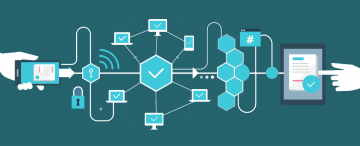
Blockchain is a technology that has taken the world by storm thanks in part to the revolutionary work that it has done in information management and exchange. So far, the financial sector has been the most impacted, but its success in this sector has left other industries rattling with all kinds of questions.
The most prevalent one at the moment is whether it would be feasible to use blockchain in healthcare. The healthcare sector is currently plagued with all kinds of problems, with many consumers looking online to find a better healthcare experience. With many startups now offering services like doctor consultations and even online pharmacies, the old world of healthcare looks to be slowly changing. There is still a lot of confusion around the best ways for technology to improve health outcomes, but if the current confusion were to be unraveled, implementation of this technology could bring about the following benefits:
1. Singular and Longitudinal Patient Records
Longitudinal client accounts – capturing treatments, compiling episodes, lab results, and even disease registries can easily be achieved through the use of blockchain technology. The data compiled and captured by the tech would also include wearable data, ambulatory, and inpatient information.
The availability of all this information would make it easier for care providers to devise better ways to deliver care to their patients.
2. Interoperability
Blockchain has one promise, which is interoperability. This can be fulfilled and realized through the utilization of application programming interfaces, which then helps to make data storage and electronic health records’ interoperability a more reliable process.
Implementing blockchain in healthcare means that the network would easily be able to share information with providers who have already received authorization. Information sharing would occur in an ecosystem that was standard and secure.
This would, in return, help eliminate the burden and expense commonly associated with the reconciliation of data.
3. Master Patient Indices
It is not uncommon for duplication or mismatching to occur when one is dealing with health records. Additionally, you will find that different electronic health records tend to have different methods of manipulating and capturing patient information, including simple and basic data sets.
The good thing about adopting and implementing blockchain in this industry is that all data would be captured and hashed to one ledger. This means that the days of having to deal with single primary keys would be left behind in history where they belong.
All a user would need to do is locate the address. With blockchain, there is a possibility of having multiple keys and multiple addresses. But regardless of being many, the addresses and the keys will all yield to one patient identifier.
4. Supply Chain Management
Smart contracts are another feature associated with blockchain. Blockchain enthusiasts favor the contracts due to their simplicity. In healthcare, they would make it possible for health organizations to carefully monitor and evaluate the demand and supply cycles.
Supervisors would be able to follow the entire cycle, including how a transaction is proceeding. They would also be able to know the status of a transaction, including whether it had gone through and whether there are delays that may have cropped up in the supply chain.
5. Claims Adjudication
Given the fact that blockchain typically works using validation-based exchanges, it would become easier and faster to verify claims automatically. This is because the network would need to agree on how each contract would be executed. The fact that blockchain does not have a central or commanding authority means that healthcare facilities would now experience fewer errors and fraud cases.
Apart from the five benefits mentioned above, blockchain technology can also assist in transforming clinical trials, revenue cycle management, drug supply management, and help to curb fraud and corruption in healthcare centers.
Conclusion
As the world looks forward to implementing blockchain in healthcare, the potential benefits that the industry stands to enjoy are dependent on the willingness of the healthcare companies to come up with the requisite infrastructure. While blockchain is by itself costly, there are emerging concerns about cultural adoption as well as whether it will fit in well with the current technology.
This is an article provided by our partners network. It does not reflect the views or opinions of our editorial team and management.
Contributed content
Read More:
tech trends with phaneesh murthy
why are mobile devices critical to a digital forensics investigation?
earning a degree can be expensive but which example shows why it might be worth it?

Founder Dinis Guarda
IntelligentHQ Your New Business Network.
IntelligentHQ is a Business network and an expert source for finance, capital markets and intelligence for thousands of global business professionals, startups, and companies.
We exist at the point of intersection between technology, social media, finance and innovation.
IntelligentHQ leverages innovation and scale of social digital technology, analytics, news, and distribution to create an unparalleled, full digital medium and social business networks spectrum.
IntelligentHQ is working hard, to become a trusted, and indispensable source of business news and analytics, within financial services and its associated supply chains and ecosystems










